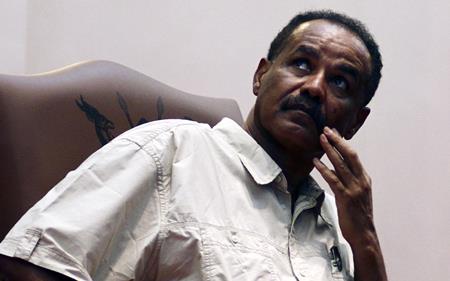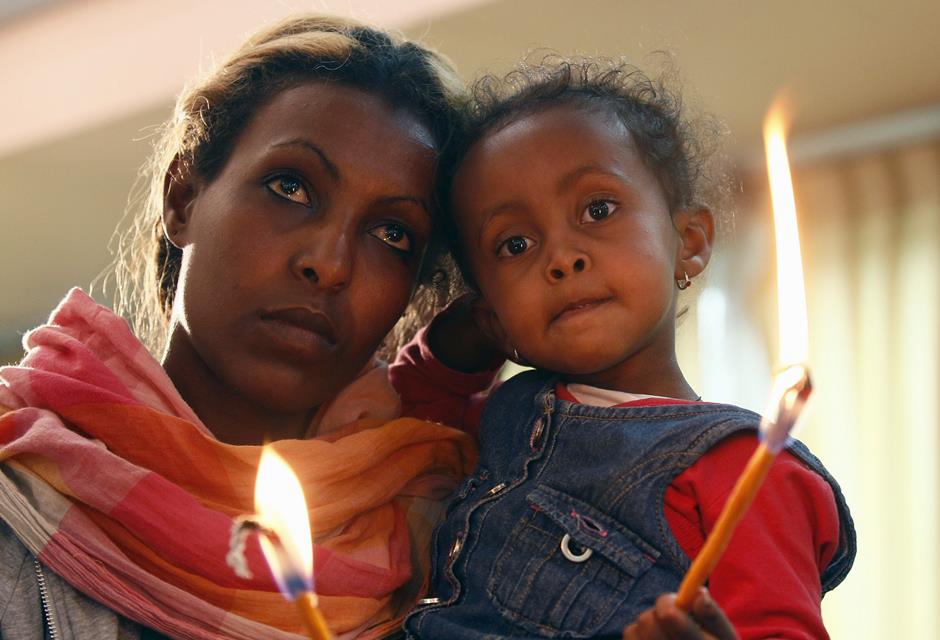Eritrea: AFRICA’S WANNABE MAO WITH A MUSTACHE
BY LAURA SECORUN PALET
In October 2013, scores of people from Eritrea drowned when the boat that had promised to carry them to Europe sank. Since then — and despite the clear danger of the journey — the number of asylum-seekers from this small East African nation, population 6.3 million, has tripled to almost that of Syrians. But unlike Syria, Eritrea is not engulfed by civil war. So what are these people fleeing?
That’s an easy two-word answer: Isaias Afwerki.
The mustachioed 69-year-old has been the president of Eritrea since its independence, in 1991, yet not a single vote has ever been cast in his favor. Twenty-four years of President Afwerki’s despotism, Marxist rhetoric and army manners — he’s forced every citizen into indefinite military conscription and crushed anything that smells of opposition. Twenty-four years without an election, a constitution, free press or an independent judiciary. As a result, Eritrea is internationally ostracized and chronically poor, and it leads the world in only two categories: media censorship (take that, Kim Jong Un) and child labor.

Source: James Akena/Corbis
True, Eritrea owes Afwerki a lot — its existence. For more than 20 years, the stern man headed the armed struggle against Ethiopia that led to the country’s independence. “He was able to mobilize a nation and free his country,” says Nicole Hirt, an associate researcher at the GIGA Institute of African Affairs, in Hamburg. Many in the diaspora consider him a national hero. They view Afwerki as a man of the people, one who works for them 24/7 and takes his coffee in the public cafes instead of in some gilded dining room. True, the diaspora are at a safe remove. The last time Afwerki was in New York, in 2011, thousands of Eritreans came to catch a glimpse of him outside the U.N. Their signs read, “We are him. He is us.”
Western democracies do snub him, but Afwerki doesn’t need them for loans, investment or stamps of approval. He has China. In 2013, the Chinese government offered the country a $100 million loan to build agricultural infrastructure. A Chinese company owns 60 percent of a gold mine near Asmara, and recently, the $400 million construction contract for a new cargo terminal in the city of Massawa was given to — you guessed it — another Chinese company.
The president’s relationship with Beijing goes way back, to when — as a wide-eyed 20-year-old — Afwerki was invited to China for military training. After his return, he promised fellow Eritreans democracy, but things look different from the vantage of power. Afwerki took a few pages from Chairman Mao’s Little Red Book and turned his newborn country into a one-party state, purging all opposition members — even inside his own ranks — and treating his citizens as if they were soldiers. Between 1998 and 2000, he even went to war with Ethiopia over border disputes.
The threat of war is Afwerki’s justification for forcing all men and women, ages 15 to 70, into indefinite, often unpaid military service. In times of peace, this looks a lot like forced labor, reaching everything from the state-owned construction companies and mines to schools and hospitals. In many countries, children say they want to be astronauts when they grow up. “In Eritrea, they say soldier. They know that’s their only choice,” says Meron Estefanos, a Swedish human rights activist of Eritrean descent who lived in Asmara, the capital city, for a few years.
And if they aspire to journalist? Or opposition leader? Those who dare find themselves behind bars without charge or trial. Torture is routine, and prisons are so overcrowded that detainees are often crammed into basements or shipping containers, according to Amnesty International. That’s where many journalists end up. Seyoum Tsehaye, the former head of Eritrea’s television and radio services, has been in prison since 2001, and in 2009, authorities detained the entire staff of local Radio Bana.
Regime change? Afwerki would have to die or be deposed.
Which mostly explains why, according to the U.N. High Commissioner for Refugees, some 4,000 Eritreans leave the country each month; in fact, more than 5 percent of Eritrea’s population has fled in the past decade. Even members of the national football team escaped and were granted asylum in Uganda. Many countries have spoken up against Afwerki’s tyrannical ways. The U.N. has imposed sanctions against Eritrea since 2009 for sponsoring armed groups in neighboring Somalia, the Human Rights Council has repeatedly condemned the “continued widespread and systematic violations of human rights” and even President Barack Obama refused to invite President Afwerki to last year’s U.S.-Africa Leaders Summit. The only other pariah was Robert Mugabe, the man who’s been leading Zimbabwe into a hole for 35 years.

Source: Tiksa Negeri/Corbis
Yet none of this seems to be having the slightest effect on Eritrea’s defiant dictator, whose media office did not return our messages. “It’s virtually impossible to put pressure on a regime that is so isolated,” says Hirt. “You can’t even threaten to cut aid, because you’re not sending any.” A voluntary democratic transition is out of the question. Free elections are a pipe dream. The political opposition is divided and remote, with more than 40 different political parties in exile. Regime change? Afwerki would have to die or be deposed, probably by an Ethiopian-funded armed group or Eritrea’s military, a branch of which already attempted a coup and failed in 2013.
For now, Afwerki portrays his international isolation as self-reliance. But the uproar grows, and the opposition is feeling hopeful. “The day is getting closer,” says Estefanos. “No dictatorship lasts forever.”


![[AIM] Asmarino Independent Media](/images/logo/ailogo.png)